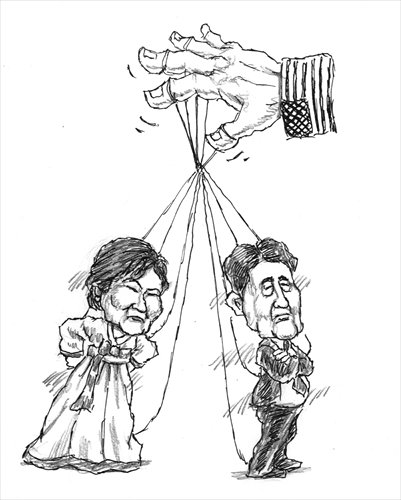HOME >> OP-ED
South Korea-US alliance strained by Japan
By Moon Chung-in Source:Global Times Published: 2013-11-7 19:48:01

Illustration: Peter C. Espina/GT
Celebrating the 60th anniversary of the South Korea-US alliance, South Korean President Park Geun-hye and US President Barack Obama declared it to be a comprehensive, strategic alliance, as well as one of sharing and caring, during the May summit in Washington, DC.
While "comprehensive" refers to an alliance that goes beyond just military aspects to include economics and politics, "strategic" implies expanding the zone of cooperation from beyond just the Korean Peninsula to the Asia-Pacific region and the world.
The phrase of "sharing and caring" hints at a new humanitarian component in which South Korea will join the US in extending humanitarian assistance on a global basis.
It is noteworthy that Park replaced the previous government's "value alliance" with the language of "sharing and caring." This might be a calculated move to ease China's concerns.
For the past 60 years, the bilateral alliance has been remarkably successful, based on a mutual defense treaty, the US troop presence in South Korea, Combined Forces Command, and defense cost sharing. But cracks have recently begun to surface, partly because of worsening Japan-South Korean relations.
The US values close ties between the two countries, not only because each is a traditional US ally, but also because their close cooperation is vital to the "pivot to the Asia-Pacific region."
Most observers expected that Park and Japanese Prime Minister Shinzo Abe would restore the damage to bilateral relations that occurred during the previous Lee Myung-bak government, because of the historical bonds between her father, former South Korean president Park Chung-hee, and Abe's maternal grandfather, former Japanese prime minister Nobuske Kishi.
But Abe's negative remarks on the history of Japanese aggression and "comfort women" as well as Japan's assertive claims over the Dokdo islets have made Park rather hostile to Japan.
Consequently, she refused to have summit talks with Abe, and has been reluctant to sign the General Security of Military Information Accord with Japan that was suspended in June last year.
Moreover, her government has been critical of Japan's decision to exercise its "collective self-defense" right that would allow its military come to the aid of an ally during a military crisis.
Washington was alarmed at this development. Defense Secretary Chuck Hagel, who met Park during his visit to Seoul on September 30, expressed concern over deteriorating Seoul-Tokyo relations.
But Park's stance remained firm, stating that there is a "lack of trust" between South Korea and Japan due to the Abe administration's chauvinism. The Obama administration seems increasingly impatient with Park's rigidity, straining otherwise congenial bilateral ties.
In addition to tensions over relations with Tokyo, two pending issues have become new sources of discord.
The first is over defense cost sharing. Since 1991, Seoul has shared the costs of US forces stationed in South Korea, such as wages for the forces' local hires, facility construction fees and service contracts.
South Korea is supposed to shoulder 869.5 billion Korean won ($778.1 million) this year, about 42 percent of the total cost, but in recent negotiations, the US, under pressure to cut defense spending, is known to have sought to increase Seoul's share up to 50 percent.
The tough stance of both parties could strain bilateral ties with immense domestic political repercussions.
The transfer of wartime operational control (OPCON) from the US to South Korea is another sword of Damocles hanging over the alliance.
Both countries agreed to transfer OPCON, which is currently under a US commander, to a South Korean counterpart by 2012. However, North Korea's increased nuclear and conventional threats led South Korea to request the US to postpone the transfer date to 2015, and the latter concurred. There is now talk of further delays in the transfer.
Finally, South Korea faces a potential strategic dilemma in maintaining its alliance with the US while continuing to build a close and mature relationship with China.
As long as North Korean threats remain, South Korea has every reason to strengthen its alliance with the US.
However, the US has arguably outsourced its North Korea policy to China, expecting Beijing both to provide the bite to a sanctions regime and forge a diplomatic solution through the Six-Party Talks.
For this and other reasons, Seoul's growing strategic dependence on Beijing poses a long-term conundrum for the South Korea-US alliance.
The author is professor of Political Science, Yonsei University, Seoul, and served as a foreign and national security affairs advisor to former president Roh Moo-hyun. opinion@globaltimes.com.cn
Posted in: Viewpoint